Related Research Articles
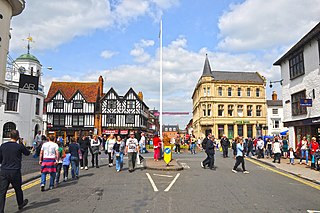
Stratford-upon-Avon, commonly known as just Stratford, is a market town and civil parish in the Stratford-on-Avon district, in the county of Warwickshire, in the West Midlands region of England. It is situated on the River Avon, 91 miles (146 km) north-west of London, 22 miles (35 km) south-east of Birmingham and 8 miles (13 km) south-west of Warwick. The town is the southernmost point of the Arden area on the edge of the Cotswolds. In the 2021 census Stratford had a population of 30,495.
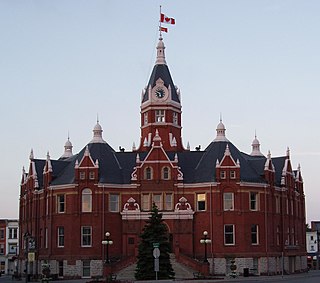
Stratford is a city on the Avon River within Perth County in southwestern Ontario, Canada, with a 2016 population of 31,465 in a land area of 28.28 square kilometres (10.92 sq mi). Stratford is the seat of Perth County, which was settled by English, Irish, Scottish and German immigrants, in almost equal numbers, starting in the 1820s but primarily in the 1830s and 1840s. Most became farmers; even today, the area around Stratford is known for mixed farming, dairying and hog production.
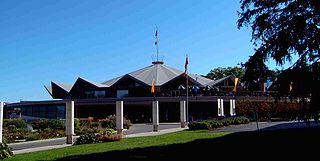
The Stratford Festival is a theatre festival which runs from April to October in the city of Stratford, Ontario, Canada. Founded by local journalist Tom Patterson in 1952, the festival was formerly known as the Stratford Shakespearean Festival, the Shakespeare Festival and the Stratford Shakespeare Festival. The festival was one of the first arts festivals in Canada and continues to be one of its most prominent. It is recognized worldwide for its productions of Shakespearean plays.

The Royal Shakespeare Theatre (RST) is a grade II* listed 1,040+ seat thrust stage theatre owned by the Royal Shakespeare Company dedicated to the English playwright and poet William Shakespeare. It is located in the town of Stratford-upon-Avon – Shakespeare's birthplace – in the English Midlands, beside the River Avon. The building incorporates the smaller Swan Theatre. The Royal Shakespeare and Swan Theatres re-opened in November 2010 after undergoing a major renovation known as the Transformation Project.

Warwickshire is a county in the West Midlands region of England. The county town is Warwick, and the largest town is Nuneaton. The county is famous for being the birthplace of William Shakespeare at Stratford-upon-Avon and Victorian novelist George Eliot,, at Nuneaton. Other significant towns include Rugby, Leamington Spa, Bedworth, Kenilworth and Atherstone. The county offers a mix of historic towns and large rural areas. It is a popular destination for international and domestic tourists to explore both medieval and more recent history.
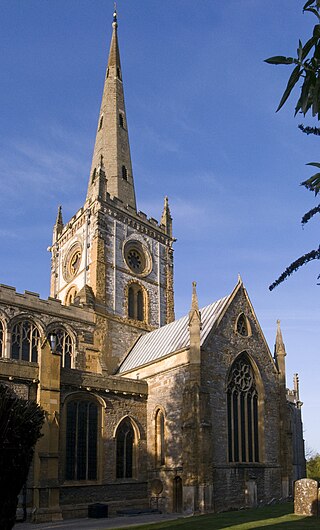
The Collegiate Church of the Holy and Undivided Trinity, Stratford-upon-Avon, is a Grade I listed parish church of the Church of England in Stratford-upon-Avon, Warwickshire, England. It is often known simply as Holy Trinity Church or as Shakespeare's Church, due to its fame as the place of baptism, marriage and burial of William Shakespeare. More than 200,000 tourists visit the church each year.

Stratford is a town on the Avon River in Victoria, Australia, 232 kilometres (144 mi) east of Melbourne on the Princes Highway in Shire of Wellington. At the 2016 census, Stratford had a population of 2617. The town services the local regional community and travellers on the Princes Highway. Stratford's principal industries are dairying, sheep, cattle and horse breeding and vegetable crops. The town has numerous coffee shops and cafes, a cellar door for a local winery, Design Gallery, model railway shop, a pub, parks and playgrounds for car travelers to break their journey.

Sir Stanley William Wells, is a Shakespearean scholar, writer, professor and editor who has been honorary president of the Shakespeare Birthplace Trust, professor emeritus at Birmingham University, and author of many books about Shakespeare, including Shakespeare Sex and Love, and is general editor of the Oxford and Penguin Shakespeares. He lives in Stratford-upon-Avon and was educated in English at University College, London (UCL).

Sir Francis Robert Benson, known professionally as Frank Benson or F. R. Benson, was an English actor-manager. He founded his own company in 1883 and produced all but two of Shakespeare's plays. His thirty-year association with the Shakespeare Memorial Theatre and the annual Shakespeare Festival in Stratford-upon-Avon laid down foundations for the creation of the Royal Shakespeare Company after his death.

Wilmcote is a village, and since 2004 a separate civil parish, in the English county of Warwickshire, about 3 miles (5 km) north of Stratford-upon-Avon. Prior to 2004, it was part of the same parish as Aston Cantlow, and the 2001 population for the whole area was 1,670, reducing to 1,229 at the 2011 Census.

The Grammar School of King Edward VI at Stratford-upon-Avon is a grammar school and academy in Stratford-upon-Avon, Warwickshire, England, traditionally for boys only. However, since September 2013 the school has admitted girls into the Sixth Form. It is almost certain that William Shakespeare attended this school, leading to the school widely being described as "Shakespeare's School".
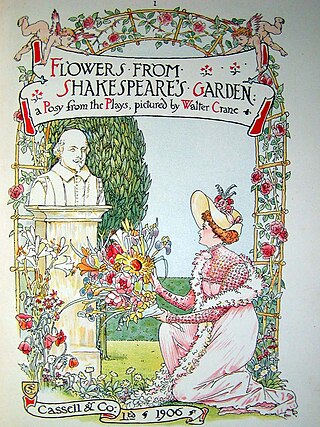
A Shakespeare garden is a themed garden that cultivates some or all of the 175 plants mentioned in the works of William Shakespeare. In English-speaking countries, particularly the United States, these are often public gardens associated with parks, universities, and Shakespeare festivals. Shakespeare gardens are sites of cultural, educational, and romantic interest and can be locations for outdoor weddings.

The Shakespeare Birthplace Trust (SBT) is an independent registered educational charity based in Stratford-upon-Avon, Warwickshire, England, that came into existence in 1847 following the purchase of William Shakespeare's birthplace for preservation as a national memorial. It can also lay claim to be the oldest conservation society in Britain. Receiving no government funding or public subsidies, it is totally dependent upon the public for support, and relies on donations and the income generated from visitors.

William Shakespeare has been commemorated in a number of different statues and memorials around the world, notably his funerary monument in Stratford-upon-Avon ; a statue in Poets' Corner in Westminster Abbey, London, designed by William Kent and executed by Peter Scheemakers (1740); and a statue in New York's Central Park by John Quincy Adams Ward (1872).
The White Lion Inn was a public house located in Henley Street, Stratford-upon-Avon, England, an example of Elizabethan architecture that first appears in historical records in 1591. The building was mentioned by both Harriet Beecher Stowe and Rupert Graves.

The Shakespeare Jubilee was staged in Stratford-upon-Avon between 6 and 8 September 1769. The jubilee was organised by the actor and theatre manager David Garrick to celebrate the Jubilee of the birth of William Shakespeare. It had a major impact on the rising tide of bardolatry that led to Shakespeare's becoming established as the English national poet. Thomas Arne composed the song Soft Flowing Avon for the Jubilee.
A Shakespeare festival is a theatre organization that stages the works of William Shakespeare on an ongoing basis.
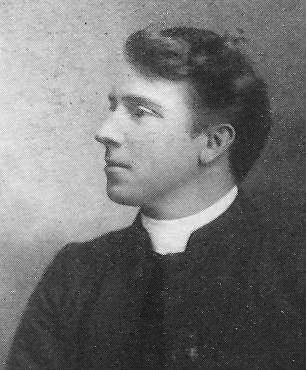
Edgar Innes Fripp was a Unitarian minister and English antiquarian who specialized in Shakespearean research in the archives of Stratford-upon-Avon, and the father of the artist Paul Fripp.

Stratford's Historic Spine is the name given to a route in Stratford-upon-Avon along which many of the town's most important and historic buildings are sited, with many of the buildings connected to William Shakespeare. The Historic Spine was once the main route from the town centre to the parish church. It begins in Henley Street at Shakespeare's Birthplace and finishes in Old Town at The Holy Trinity Church and has buildings from the 14th up to the 20th centuries.

The purported Shakespeare's signet ring or seal ring, is a gold signet ring with the initials WS. It was found in Stratford-upon-Avon, United Kingdom, in 1810 and may have belonged to William Shakespeare. It is kept by the Shakespeare Birthplace Trust (SBT).
References
- 1 2 The Oxford companion to Shakespeare (1st ed.). Oxford University Press. 2001. p. 425. ISBN 0198117353.
- ↑ Brown, Ivor & Fearon, George. Amazing monument. A short history of the Shakespeare Industry. London & Toronto: Heinemann, 1939, p. 104
- ↑ Fox, Levi. The Borough Town of Stratford-upon-Avon. Stratford-upon-Avon: Corporation of Stratford-upon-Avon, 1953 p. 151.
- ↑ Halliday, Frank Ernest. The cult of Shakespeare. London: Gerald Duckworth, 1957, p. 135
- ↑ Brown, Ivor & Fearon, George. Amazing monument. A short history of the Shakespeare Industry. London & Toronto: Heinemann, 1939, p. 106
- ↑ Brown, Ivor & Fearon, George. Amazing monument. A short history of the Shakespeare Industry. London & Toronto: Heinemann, 1939, p. 109
- ↑ Warwickshire Advertiser 29 April 1837
- ↑ "Shakespeare Club of Stratford".
- ↑ "'Enchanted ground': celebrating Shakespeare's birthday in Stratford-upon-Avon". Shakespeare Jubilees: 1769–2014. Lit Verlag GmbH & Co. p. 49.
- ↑ "'Enchanted ground': celebrating Shakespeare's birthday in Stratford-upon-Avon". Shakespeare Jubilees: 1769–2014. Lit Verlag GmbH & Co. p. 42.
- ↑ "Elected Presidents of the Shakespeare Club".
- ↑ Brock, Susan & Morris, Sylvia. The Story of the Shakespeare Club of Stratford-upon-Avon: “Long Life to the Club Call’d Shakespearean” 1824–2016. Stratford-upon-Avon: Shakespeare Club, 2016.